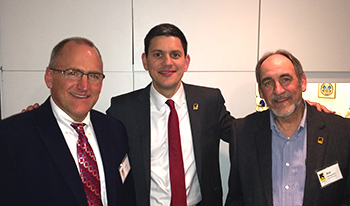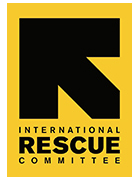The International Rescue Committee (IRC) responds to the world’s worst humanitarian crises and helps people survive and rebuild their lives. Founded in 1933, the IRC offers life-saving care and life-changing assistance to refugees forced to flee from war or disaster. When an emergency arises abroad, the IRC travels to the scene to help survivors recover and rebuild their communities. IRC is at work in more that 40 countries and 22 U.S. cities.
One of the SDWP’s funded partners, the IRC in San Diego is the largest IRC field office in the United States, both in terms of numbers served and staff. It offers many programs to assist refugees to become self-reliant and to establish San Diego as their home. It also offers services to other community members in need of financial, employment or other assistance. In 2013, IRC San Diego served nearly 8,000 people.
 SDWP President and CEO Peter Callstrom (left) met with IRC’s President and CEO, David Miliband, (center) and San Diego Executive Director Bob Montgomery to discuss collaborative efforts.
SDWP President and CEO Peter Callstrom (left) met with IRC’s President and CEO, David Miliband, (center) and San Diego Executive Director Bob Montgomery to discuss collaborative efforts.
IRC San Diego was established in 1975 to respond to the influx of refugees from Southeast Asia. The organization is now housed in two strategic locations—City Heights and El Cajon—serving refugees and other low-income families in both of these communities. Dr. Erica Bouris, IRC senior program manager of economic development, says San Diego’s significant refugee population makes it an important location for the IRC.
Bouris explains that some refugees are coming here for the first time through the federal resettlement program, and need assistance finding their first apartment, getting their first job and other critical tasks. Others have been here for years and are coming to the IRC to get assistance preparing for careers, starting small businesses or getting their teen connected to youth programs. Regardless, she says, the IRC in San Diego is here to help: “We are a dynamic, community-based organization that takes families from barely surviving to thriving.”
IRC offers a host of programs and services related to resettlement, immigration and citizenship, financial education and tax preparation, food and farming, youth, microenterprise, and employment and career development. “We pride ourselves on our bundled service approach,” Bouris says. “Someone might need tax assistance or help getting subsidies to shop at a farmer’s market or access to a credit-building loan to establish a credit score. We try to make sure we can connect you to as many services as possible to get the family to a point of self-sufficiency and stability.”
 Specific to employment and career development, Bouris says the IRC in San Diego takes a very holistic approach. The IRC employment program helps newly arrived refugees prepare for and secure entry-level employment as soon as possible after their arrival in the United States. “This level of employment is not one that requires a lot of training or skills, but is critical for getting the bills paid and establishing a work history so they can eventually move forward,” Bouris says.
Specific to employment and career development, Bouris says the IRC in San Diego takes a very holistic approach. The IRC employment program helps newly arrived refugees prepare for and secure entry-level employment as soon as possible after their arrival in the United States. “This level of employment is not one that requires a lot of training or skills, but is critical for getting the bills paid and establishing a work history so they can eventually move forward,” Bouris says.
Beyond that, IRC has a suite of programs that focuses on career development, including the Bridge to Employment program within the Health Professional Opportunity Grant (HPOG), a grant awarded to the SDWP through 2015. Bouris emphasizes the importance of focusing on both that first job and the long-term career of individuals. “Historically, employment services have focused on the first job, which is important, but we know that making $9/hour isn’t enough for lasting financial stability,” she says. “We want to help them transition to the $14/hour job.”
Another SDWP-funded program is IRC’s Connect2Work program, which addresses the academic and skill needs of vulnerable in- and out-of-school youth 17-21 years of age. The program aligns their education with real-world exposure to and training for high-growth occupations, and supports them in becoming engaged members of the community.
Bouris says a key to the IRC’s successful employment programming is its Center for Financial Opportunity (CFO), a one-stop-shop that includes employment, career development, financial education, and small business development programs. The CFO’s approach is based on the Annie E. Casey Center for Working Families integrated services model, which means that the clients receiving employment services are able to access these additional programs to help them strengthen their household financial situation as they pursue new careers.
“We are really fortunate to partner with the San Diego Workforce Partnership on the Connect2Work and HPOG grants,” Bouris adds. “Those grants have enabled us to build out the programs that connect refugees and other community members to careers and living wage jobs, which is especially important in a high cost of living area like San Diego.”
For more information about the IRC in San Diego, visit www.rescue.org/us-program/us-san-diego-ca.
